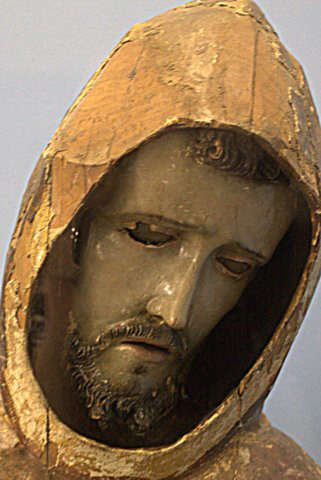
Pictured here is Giovanni Francesco di Bernardone (a.k.a. St. Francis of Assisi, d. 1226 ) – my photo of a 19th c. statue from southern Arizona, probably well worn from processions and general fondling. I understand that he started, or at least popularized the building of manger scenes.
I remember reading his early biographies some years ago. I never could decide what to think: whether he was extremely holy, mentally ill, or both. Once a well known Christian philosopher who works in medieval philosophy described St. Francis to me as “a stinker” – I think the meaning was a sort of drama queen or manipulator. So that’s another option. 😉 But I remain perplexed.
Went to a Christmas eve service tonight. At one point the pastor said that the incarnation – that God became a human being – makes no sense to us, yet at some level we – i.e. all we Christians – believe it. If I were less tired, or in a different mood, this would induce a whole series of rants/lectures from me. But, not tonight. I will just say: I am grateful that God sent us his only Son, the perfect representation of him and sure way to him.
 Here’s another pic taken at the same place as the Francis pic. This time, someone indisputably both holy and sane, also celebrated Catholic-style. Merry Christmas!
Here’s another pic taken at the same place as the Francis pic. This time, someone indisputably both holy and sane, also celebrated Catholic-style. Merry Christmas!

Forgive me for backing up; but it is more than three weeks since the above request was made.
I agree with villanovanus that the trinitarian doctrine concocted in the fourth century has no scriptural evidence to support it. That includes the title “God-the-Son,” and I don’t mind seeing that title described as “mythical”.
However, the title “Son of God” is not mythical; and there is considerable evidence that THROUGH him God created all things. That necessitates his preexistence.
Therefore, I think it is fair to ask for scriptural evidence to support the statement that the preexistence of the Messiah is mythical. Would someone please provide such evidence?
Failing that, villanovanus, perhaps your statement should be modified.
I agree with you, John. That interpretation fits the context. It also fits everything that the New Testament quotes Christ as saying.
Villanovanus
Sorry the delay in thanking you for your input!
Most interesting!
Someone else gave me an ‘angle’ on Phillipians 2v6.
It goes something like this-
Paul had in mind the story of Adam and Eve in the Garden of Eden and he states that the man, Jesus Christ, reversed what Adam did.
Adams great sin was of course, to seek equality with God – as Genesis 3v5 states “You will be like Gods”.
Far from trying to snatch equality with God and disobeying Gods commands-the verse speaks of Christ (the second Adam) humbling himself and becoming obedient – even to the point of crucifixion.
You raised the issue of the word ‘harpagmos’. I am beseiged by desperate Trinitarians trying to tell me that it means ‘holding on to”. Bible translators with integrity use the word ‘grasped’ – and if one wants confirmation of this translation, just ask a Greek friend!
Dale, so sorry to ‘abuse’ your site for ‘conversations on the side’!!
Perhaps some sort of ‘miscellaneous’ box would be useful!!
Blessings
John
Dale,
I realize that my previous post looks quite dreadful, with all that bolding. Wouldn’y it be possible to have a “preview” feature for comments? Maybe even an edit feature …? Maybe even a user-friendly text editor …? 🙂
Thanks.
John
In answer to your ‘questions’ on Philippians, here is some ‘kenosis for dummies’.
It is customary, in trinitarian circles, to make a big meal of the Paulinian notion of kenosis, sometimes even flirting with the cabbalistic notion of tzim-tzum. All stems from a hyped, abusive, metaphysical interpretation of this verse …
“… but emptied [ekenôsen] himself by taking on the form [morphê] of a slave, by looking like other men, [Grk: ‘by coming in the likeness homoiôma of people’] and by sharing in human nature [Grk: ‘and by being found in form schêma as a man’].” (Phil 2:7)
… whereas it is entirely evident, to any exegete/hermeneute that is not swept off balance by unwarranted metaphysical spin, that the above verse applies to the real Jesus of Nazareth who lived in Palestine, 1st century AD, NOT to some mythical and “preexistent” “God-the-son”, as made fully clear by the context of the immediately preceding and following verses …
You should have the same attitude toward one another that Christ Jesus had, who though he existed in the form [morphê] of God did not regard equality with God as something to be grasped, [Grk: harpagmos, ‘robbery’] but emptied himself by taking on the form [morphê] of a slave, by looking like other men, and by sharing in human nature. He humbled himself, by becoming obedient to the point of death – even death on a cross! (Phil 2:5-8)
In the 4th century, when the “trinitarian” solution of the Christological question was being concocted, the notion of kenosis had NOT (yet) acquired the meaning of something like “temporary metaphysical emptying of divine prerogatives”. Both the Arians and their (orthodox) opponents affirmed that God is entirely free from passion and change. The orthodox position held this view in regard to the divine nature of Christ, which is homoousios with God, but allowed the human nature to suffer.
Athanasius, in particular, said of the Logos that …
The Word perceived that corruption could not be got rid of otherwise than through death; yet He Himself, as the Word, being immortal and the Father’s Son, was such as could not die. For this reason, therefore, He assumed a body capable of death, in order that it, through belonging to the Word Who is above all, might become in dying a sufficient exchange for all, and, itself remaining incorruptible through His indwelling, might thereafter put an end to corruption for all others as well, by the grace of the resurrection. [Athanasius of Alexandria, On the Incarnation, 2. The Divine Dilemma and Its Solution in the Incarnation, (9) – emphasis added]
So the unchanging, incorruptible and impassible Logos, impassibly (“by His own impassibility”) endures suffering in the body…
He manifested Himself by means of a body in order that we might perceive the Mind of the unseen Father. He endured shame from men that we might inherit immortality. He Himself was unhurt by this, for He is impassible and incorruptible; but by His own impassibility [en tê eautou apatheia] He kept and healed the suffering men on whose account He thus endured. [Athanasius of Alexandria, On the Incarnation, 8. Refutation of the Gentiles (continued), (54) – emphasis added]
… which clearly means, in short, that, according to Athanasius, in this body that “He” adopted, the Logos (“God-the-son”) did not really suffer, but only feigned anguish and ignorance “for our sake”.
Dale
You seem to be arousing the ire of the ‘die-hard traditionalists !
For those who claim that Mary was ‘carrying God’ I would like to pose the question- is the God of the OT a different God from the “triune’ God?
The scriptures say that the God of our fathers, YHWH , was none other than “the God and Father of our Lord Jesus Christ” See Acts 3 v 13
“The God of Abraham, Isaac and Jacob
The God of your ancestors
Has given divine glory to his servant Jesus.”.
Acts is full of such statements.
Someone recently suggested that a very early writing- Philippians 2 – amounted to a recognition that the post-resurrection church recognised the ‘deity’ of Christ.. On reading the scripture I kept asking myself -“did a single person living circa 40 CE have any idea that the God being referred to was other than YHWH?”.
If one had discussed a “three persons sharing one substance- and by the way one has two natures!”God, one would have been relegated to a lunatic asylum!
The Trinitarian interpretation of Philippians is full of contradictions-
Which God is being referred to?
Which “Father’ is being referred to?
If Christ is God and Christ died, did God die?
If Christ is God, is God now elevating himself?
What did “God” empty himself of?
Ah, but it’s all a mystery to be sure!!!!
Blessings
John
What church and why do you go? 😛
‘Tis the season for paradox-mongering.
Oh, amen!
I, too, was at a service last night, mainly because I was caring for a mentally handicapped woman whose attention span is short. There was quite a bit of role-playing, and it served the purpose of entertaining my friend, for which I was grateful.
In his closing remarks, the pastor wondered how Mary must have felt, “knowing that she was carrying the God of the universe.”
That never crossed Mary’s mind. She was told she was carrying a child who was the Son of God; but she certainly wasn’t carrying God, the Father of that child.
However, I was a guest there; so I won’t ask the pastor if, when his wife was carrying his child, she was also carrying him.
Comments are closed.